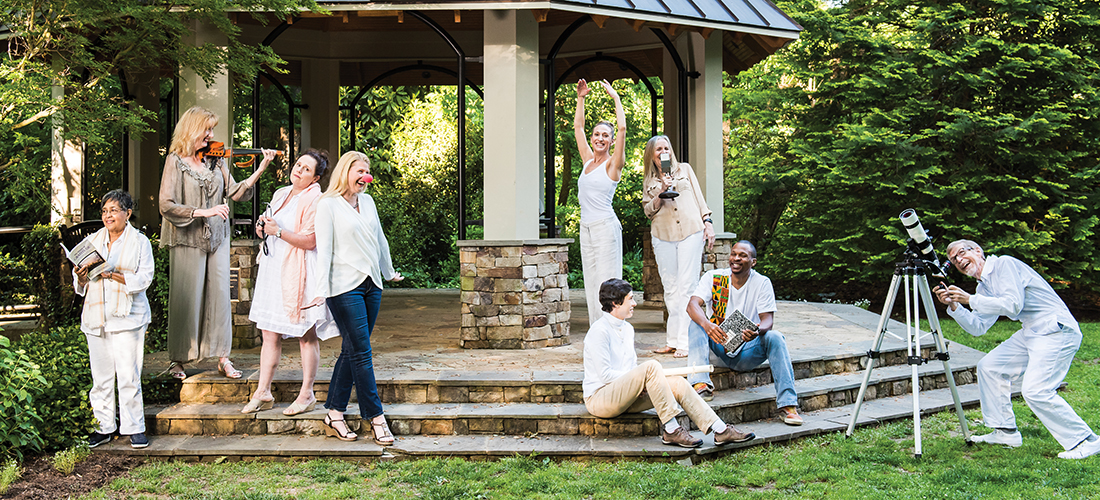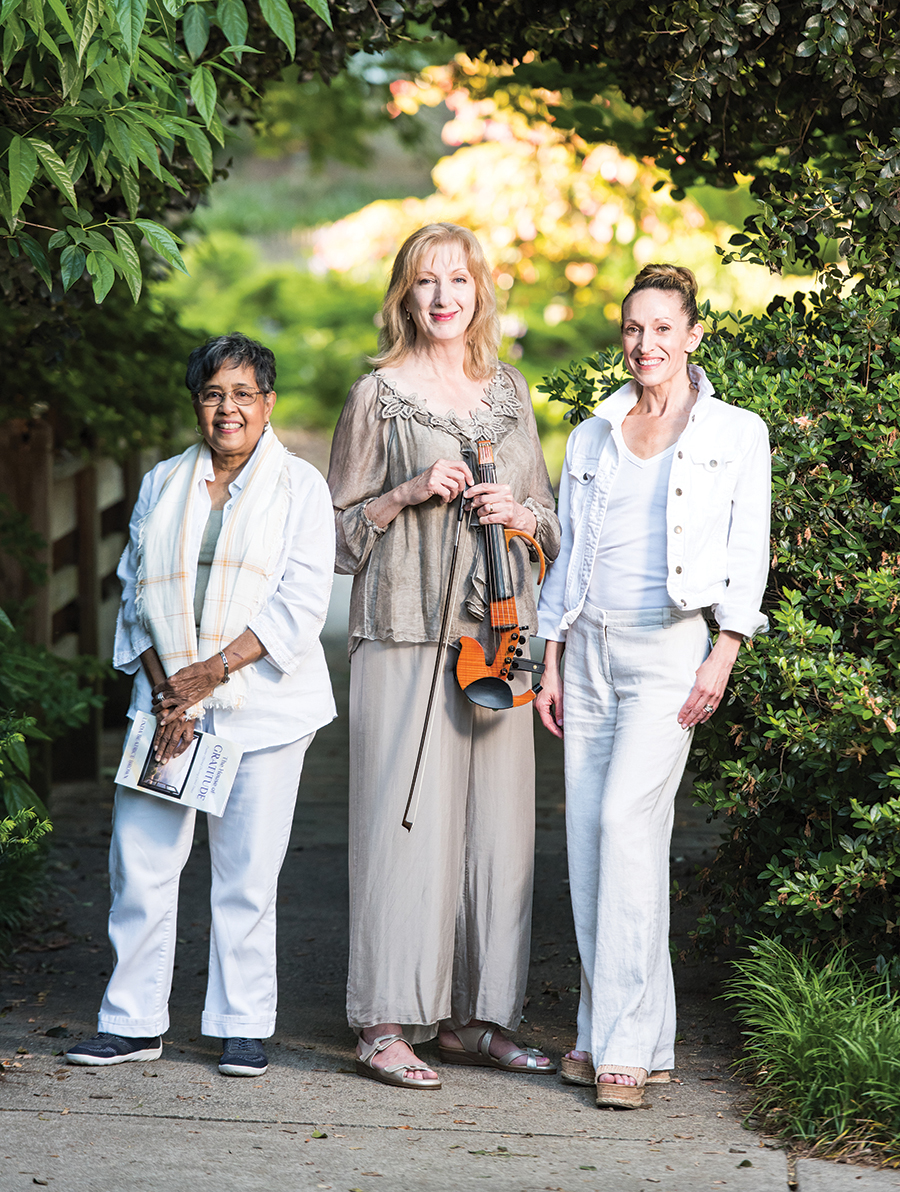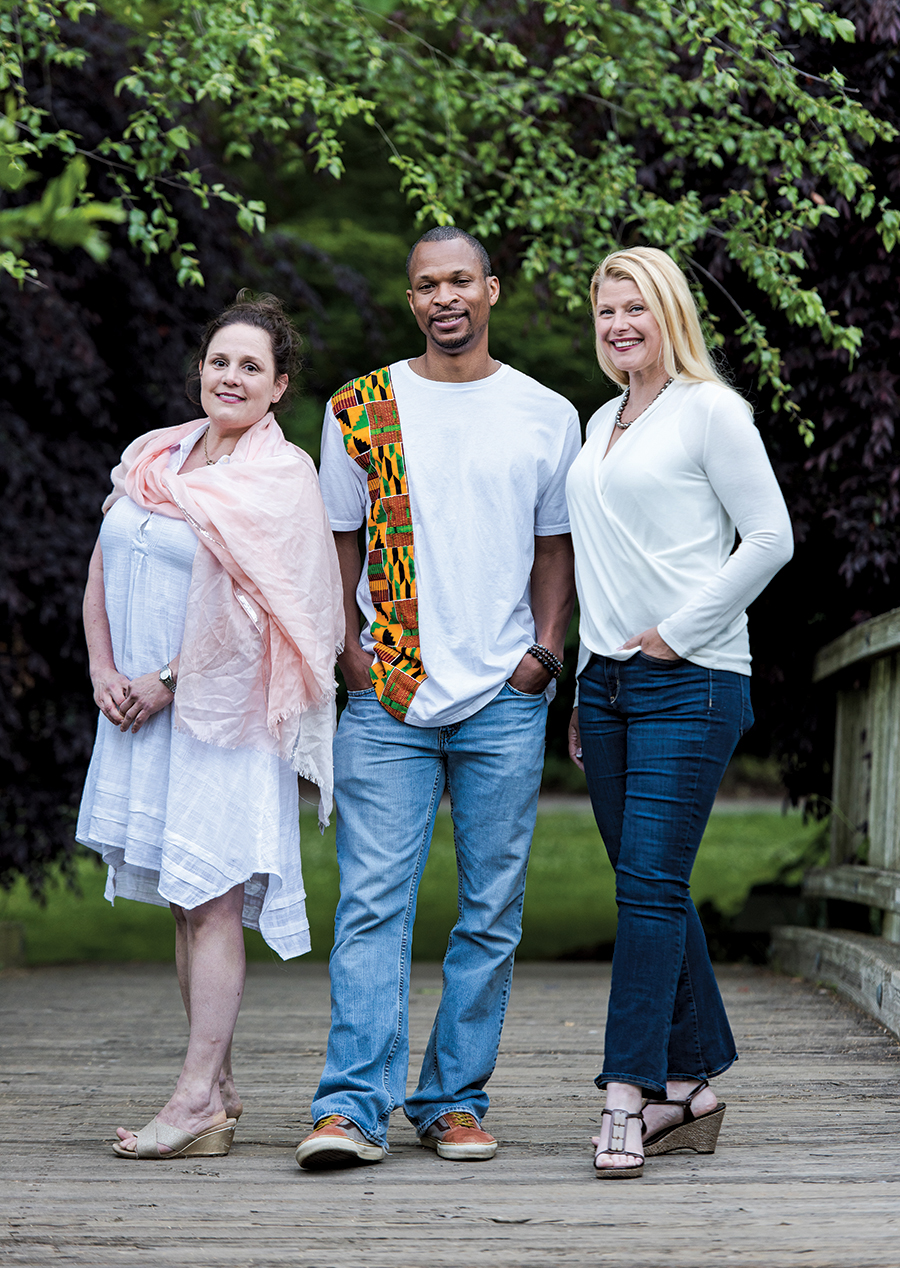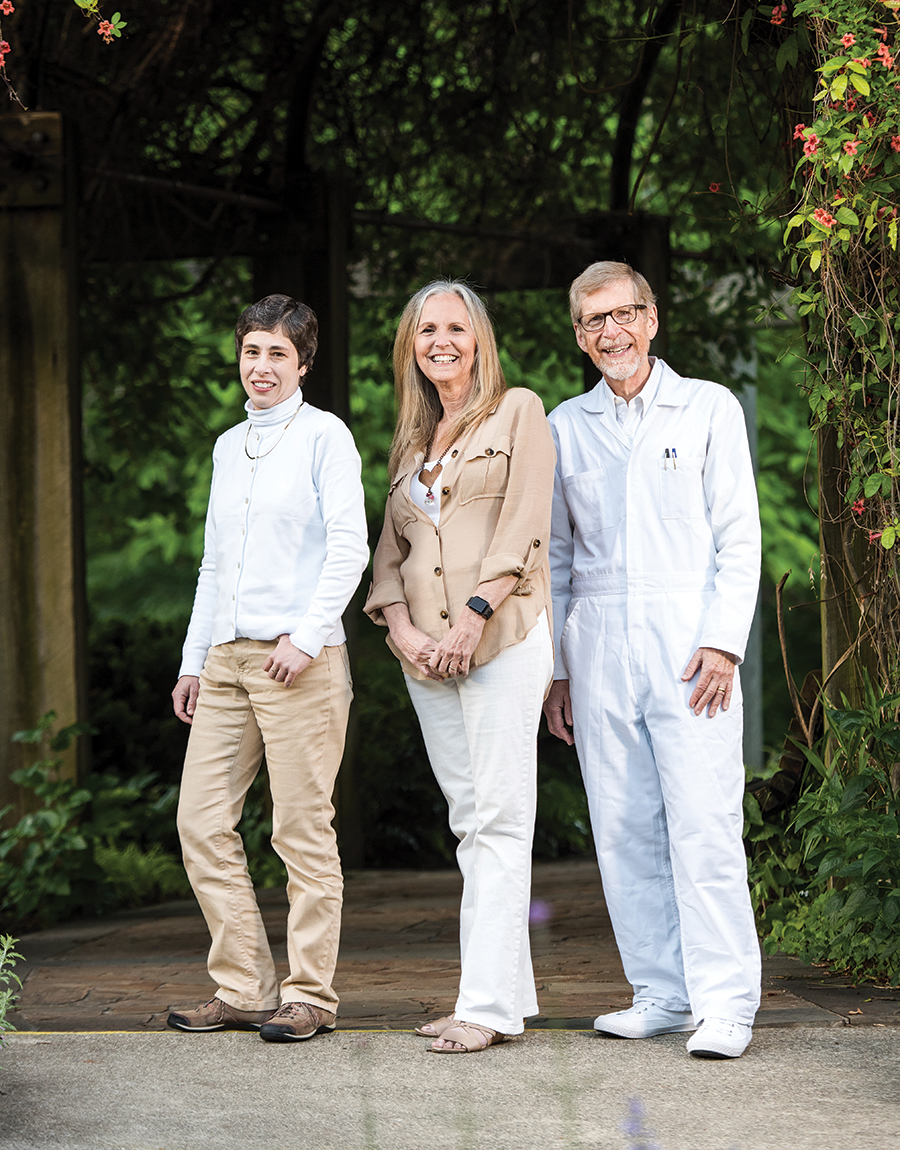
Nine divinely inspired humans who live, breathe and encourage creative compassion in Greensboro
By the Muses of O.Henry • Photographs By Amy Freeman
In Greek Mythology, the Muses are nine divine forces, each with a sacred gift to help guide, heal and inspire the human spirit.
Wholly dedicated to the Arts, they embody creation itself and have long been called upon by writers, painters and philosophers to fan the flames of imagination and wonder. They sing and dance in the space between realms, ever revealing glimpses of heavenly grace and beauty to those seeking enlightenment.
Yet such influential beings are not lost to the mythic past. They are here, in our Gate City, walking among us.
We are fortunate to have many — men and women alike — all here to awaken something deep within us with their vision, compassion, talents and wisdom.
On these pages, we celebrate nine.
We see you, brilliant lights. And lucky for all of us, Greensboro pulses with creative inspiration now more than ever.

Muse of Sacred Poems
Linda Beatrice Brown
Award-winning author and retired professor Linda Beatrice Brown has always been “kind of rebellious.” As a student at Bennett College, she took part in the Greensboro sit-ins, which she wrote about in Belles of Liberty some 50 years later. Although she had faithfully attended the Episcopal church since she was a girl, Brown “temporarily closed the church door” as a young adult until a profound metaphysical experience secured her faith in a higher power a few years later. “At that point, I deliberately set out on a spiritual journey,” she recalls. Her writing improved. When a deadline loomed, for instance, and her direction was unclear, Brown would sink into meditation and ask for clarity. Guidance always came, and whether she was working on a novel, play, poem or nonfiction, this silent dialogue between Brown and the “Invisible Universe” became a natural part of her writing process. Her collections of “Mary poems” — A Mother Knows Her Child (2014) and Something of His Mother to Remember (2016), both about the mother of Jesus — are her most intense examples. They were “gift poems,” she explains, meaning they arrived in a flash, practically complete. During the pandemic, Brown was guided to write a new “Poem for Peace” each week for over a year, which she shared with her mailing list every Tuesday. You can find them in The House of Gratitude, to be released later this year. Her sequel to Black Angels — a novel for young adults — is also in the queue. Then, says the Muse of Sacred Poems, she’ll return to writing her spiritual memoirs, no doubt infused with sacred poetry. –AW
Muse of Music
Marta Richardson
When Marta Richardson plays her electric violin, she isn’t going through the motions. She is answering a call, transmitting what sounds like an ancient love song through her bow and strings. While the song is not her own — the “download of sound” comes from a Divine source, she will tell you — Richardson knows she has a gift. And so, says the performer and educator, “I serve the music.” Marta’s father was 10 years old when Nazi Germany invaded his native Poland. After the war, he came to the States as a displaced person, then settled in Greensboro when he married Marta’s mother, Betty. His hands are “so large that he can’t play a piano key without hitting two,” the muse says of her father. And since he never got the chance to express himself musically, he wanted Marta to play the violin. It became her “salvation.” After graduating from the UNCG School of Music in 1981, Richardson discovered improvisation and how to make spontaneous music with others. Since 2002, Richardson has been empowering students at Peeler Open School for the Performing Arts. Through the years, she has collaborated with various local musicians, spoken word poets and visual artists. She was a founding member of the nationally acclaimed world music band Songs of Water and released a solo album called Mystic Canticle. Last year, she and musician Rory Paul launched a podcast called The Creative Coop with the Winter Chickens. As she tells her flock of violinists at Peeler: “Find your sound. You don’t have to do the classical thing. But find your sound and the violin can open doors.” –AW
Muse of Dance
B.J. Sullivan
B.J. Sullivan has been teaching contemporary dance at UNCG School of Dance for 20 years. Not once has she tried to “fix” one of her students by manipulating their posture or positioning. In fact, she has made it her life’s work to help them discover that “the technique is inside of them.” The youngest of five kids, Sullivan grew up in the apple orchards of upstate New York, where her father worked 16-hour shifts at a nuclear power plant and her mother was a waitress. She begged her parents to let her take ballet lessons, which they couldn’t afford. But her mother asked the studio owner if they could barter. “I started cleaning the studio bathroom,” says Sullivan, who showed up to her first dance class at age 11 wearing the purple Lycra leotard and tights her mom found on a sales rack. “Everyone else was wearing black,” she says. “I stuck out.” And during that very first class, she had the overwhelming sensation of knowing “this is who I am.” Her instructor knew it too, and when Sullivan was 13, her teacher flew her to Boston to audition for the Boston Ballet School. “The rest is history,” says Sullivan, who has a B.F.A. from The Juilliard School and an M.F.A. from the University of Illinois Urbana-Champaign, where she began developing her own approach to dance, an evolving and globally studied body of work known as “Safety Release Technique.” Our bodies are amazing, says the Muse of Dance. Helping others awaken to their body’s own wisdom and flow is what continues to feed her soul. –AW

Muse of Tragedy
Dr. Sara Fletcher
“I’m here to shorten their death, not their life,” says our Muse of Tragedy, Dr. Sara Fletcher, who has euthanized thousands of terminally ill dogs and cats while comforting the family that loved them. “Helping them leave is my unfortunate superpower,” the Hospice veterinarian says with a gentle smile. “It’s 40 percent of my practice.” The premise of her mobile service, Greensboro Veterinary Housecalls, is to allow dogs and cats to spend their last hours in the comforting presence of their home and those who cared for them. Fletcher’s beloved greyhound, Sophie, was the catalyst for her roving practice (see O.Henry’s July 2014 Dog Issue for the full story). Animals seem to automatically intuit her compassionate purpose, relaxing at her touch. Humans have the same response. When this happens, Fletcher is able to facilitate a peaceful and often beautiful transition for everyone. In the throes of the pandemic, veterinarians grew particularly overwhelmed as many owners worked at home, more closely attuned to their pets and somehow more willing to accept the unfathomable: that death is often the humane choice. In the last six months, her practice averaged 20–30 such visits monthly. Dr. Sara, as she is affectionately known, confesses that grieving pet owners often ask her if she can “come back” when it’s their time. Recently, Fletcher reached her father’s bedside in Kansas City as he battled COVID, his lungs ravaged. He died on March 1. “There is even a light in death . . . a peace,” she says. “The anxiety and sadness leaves. That relief is natural.” She strokes Tulip, her cat. “Death is not the worst thing that can happen,” she underscores. “It’s the last.” –CA
Muse of Epic Poetry
Josephus Thompson III
To thousands of school kids, Greensboro spoken word artist Josephus Thompson III is The Poetry Man. “I can’t go to a McDonald’s or a Chick-fil-A without someone going, ‘Hey, you came to my third-grade class!’” he says. Since 2009, when he founded The Poetry Project, Thompson has made it his business, literally, to spread the joy found in similes and metaphors, lyrics and jingles, rhymes and raps, and onomatopoeia. Fizz. He teaches the teachers, too, via The Poetry Project Institute. Listeners relish the wordplay on his radio show, The Poetry Cafe (Tuesdays at 6 p.m. on WNAA, 90.1 FM), a showcase of open-mic artists and music from around the world. Pre-COVID, Thompson hosted live open mics, poetry camps and college events. COVID has taught him how to work virtually. In April, he presented The Freedom Slam, with entrants from around the country competing for a $1,000 prize at the Greensboro Cultural Center, minus a live audience (see excerpts on his Facebook page; check out Thompson himself in “Breathe by Josephus III” on YouTube). Finding the most efficient way to get the job done comes naturally to Thompson, who landed in Fayetteville with his Army family at age 16 and later earned an industrial engineering degree from N.C. A&T State University. The engineering jobs never materialized, so he worked as a manager for UPS until his schoolhouse poetry gigs became more profitable than packages. Now 44 and the father of a 2-year-old (see the O.Henry Ending on page 80 of this issue), The Poetry Man doesn’t miss a beat. –MJ
Muse of Comedy
Jennie Stencel
You could call Jennie Stencel the mother of good humor in Greensboro. Seriously. Since opening The Idiot Box almost 20 years ago, she has grown her comedy club into the rarest of creatures: a long-lived, locally owned, middle-sized ha-ha shop (80 seats) with a menu of shows ranging from stand-up to improv, from sketch to the popular open-mic Thursdays. Stencel shepherds a troupe of 35 players — local folks with day jobs — and a comedy school to boot. Four years ago, she founded The North Carolina Comedy Festival, which showcases hundreds of comedians from around the country every year. Well, almost. Last year’s fest was a bust. This year, it’s scheduled for September. After a year of restricted funny business, Stencel is exercising maternal caution in reopening the Box in a new location at 503 North Greene Street, adjacent to her recently acquired and aptly named Next Door Beer Bar & Bottle Shop. “If I see a group of comedians standing around, I’m like, ‘Hey! Six feet!’ I’m actually not that nice — but I do like to spread joy.” The real-life mom of three kids — ages 17, 20 and 21— started a Chapel Hill improv group with her husband, Steve Lesser, in the ’90s before the couple moved to Greensboro to open their own stage in 2003. Stencel then took a turn in local television. When she rapped a traffic report for WXII-TV in 2007, the video went viral. The Tonight Show with Jay Leno wanted to book her. A serious-minded station manager intercepted the call and said no. Stencel, now 44, got the last laugh. Three years ago, Greensboro’s Jourdain Fisher, a veteran of the Box, debuted on The Tonight Show with Jimmy Fallon and landed a writing job there. Another former Boxer, UNCG grad Sayjal Joshi, works for The Second City, the famed Chicago improv group. –MJ
Muse of History
Elise Allison
If anyone has grasp of the past, it’s Elise Allison, archivist at the Greensboro History Museum. Officially, she’s responsible for all of the museum’s paper-based materials, plus audio and visual recordings — another way of saying she’s in charge of the words, sounds and images that make up the city’s memory. “They’re a window on the past. They tell you that life wasn’t always easy,” says Allison, a Maryland native and former math teacher who, after bagging two master’s degrees — one in library science from Carolina, one in public history from N.C. State — landed at the museum as a part-time assistant archivist in 2006. Among the rarest items she has worked with: two infrequently displayed daguerreotypes of Greensboro native and former first lady Dolley Madison, taken by famous Civil War-era photographer Mathew Brady. Dolley sat for Brady in 1848, which was during the infancy of photography but long after she occupied the White House with hubby/prez James Madison. The museum’s collection of pictures is probably its richest vein, says Allison, who includes the 20th-century snaps of photojournalist and studio owner Carol W. Martin; the mill village images of Bernard Cone, a brother of textile barons Moses and Ceasar; and the work of the late photographer Otis L. Hairston Jr., who documented the African-American community. The museum’s recognition of history includes events of the not-so-distant past, exemplified by the current exhibit Pieces of Now (up through July 4), featuring local artifacts from the COVID-19 pandemic, Black Lives Matter protests and the 2020 general election. “We’re a museum. Our job is to tell stories,” says Allison. And, for this Muse of History, to preserve them for future generations. —MJ
Muse of Love Songs
Kristy Jackson
Love doesn’t always feel good. But for acclaimed songwriter Kristy Jackson, music begins flowing through her from those dark, uncomfortable spaces of the heart. Jackson has been writing songs and playing piano by ear since she was 5 years old. “It became my outlet for grief, pain and confusion,” she recalls — even for feelings that she experienced empathically. After high school, Jackson enrolled in UNCG’s music composition program but dropped all her music courses within the year. She majored in psychology instead, played in local bands, and eventually took a day job in sales. But she never stopped performing. “I felt like I had to get my songs out there,” she says. In the early ’90s, after a beach music DJ heard Jackson sing a song she’d written, “Take it Back,” with her then-band, he asked if he could send the song to country superstar Reba McEntire. “Next thing I know I’m getting a phone call from MCA Records,” she says. Jackson’s song became one of Reba’s hit singles. Another miracle happened shortly after 9/11. “I just started writing,” says Jackson, and 45 minutes later, she had a song. A friend sent Jackson’s simple work-tape recording to a local DJ, and weeks later, “Little Did She Know (She’d Kissed A Hero)” was the No. 1 requested song at the largest radio stations in New York City and beyond. Royalties from the song’s popularity went to the Twin Towers Fund, the Beamer Foundation and other 9/11 charities. “I really had nothing to do with my successes,” says the Muse of Love Songs. But as she tells aspiring songwriters: “Write a good song and it will find a home.” –AW
Muse of Astronomy
Jonathan Ward
In Jonathan Ward’s view, the sky’s the limit — which is to say a limitless source of beauty and scientific knowledge. Elected to lead the Greensboro Astronomy Club just before COVID hit (“The president turned to me and said, ‘Do you want to be the next president?’ And five minutes later they had the election,” he recalls), his mission is clear: to raise awareness of the club’s activities, including stargazing events around town and away from city lights at the Mayo River and Haw River state parks. Ward, a D.C. native, packs heavenly qualifications for the job. A telescope owner since his teenage years, he maintained an interest in space throughout his professional life as a contracts manager for a slew of federal agencies and businesses, including Boeing. He became a certified community speaker for NASA’s Jet Propulsion Laboratory and later was approved as a fellow of the Royal Astronomical Society in London — a credential that he readily admits getting in order to qualify as an on-board astronomer for Viking Cruises. Since semi-retiring to Greensboro 10 years ago (his wife, Jane Gwyn Ward, is from Reidsville), Ward turned his thirst for celestial knowledge into three books — two about the Apollo moon program and one about the Space Shuttle Columbia. He is editor and co-author of a fourth book, due out in October, about Col. Eileen Collins, USAF (Retired). Ward hopes to bring Collins to Greensboro to promote Through the Glass Ceiling to the Stars: The Story of the First American Woman to Command a Space Mission. Talk about star power. –MJ






